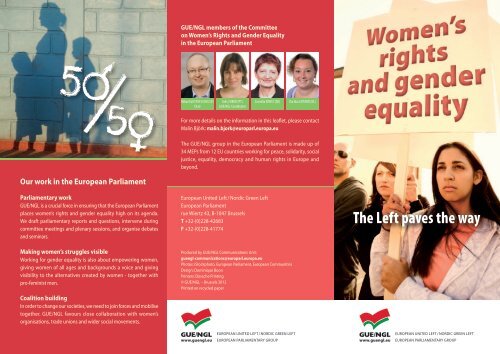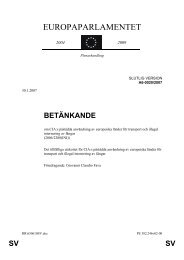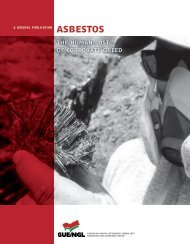Women's rights and gender equality – The Left paves ... - GUE/NGL
Women's rights and gender equality – The Left paves ... - GUE/NGL
Women's rights and gender equality – The Left paves ... - GUE/NGL
You also want an ePaper? Increase the reach of your titles
YUMPU automatically turns print PDFs into web optimized ePapers that Google loves.
Our work in the European Parliament<br />
Parliamentary work<br />
<strong>GUE</strong>/<strong>NGL</strong> is a crucial force in ensuring that the European Parliament<br />
places women’s <strong>rights</strong> <strong>and</strong> <strong>gender</strong> <strong>equality</strong> high on its agenda.<br />
We draft parliamentary reports <strong>and</strong> questions, intervene during<br />
committee meetings <strong>and</strong> plenary sessions, <strong>and</strong> organise debates<br />
<strong>and</strong> seminars.<br />
Making women’s struggles visible<br />
Working for <strong>gender</strong> <strong>equality</strong> is also about empowering women,<br />
giving women of all ages <strong>and</strong> backgrounds a voice <strong>and</strong> giving<br />
visibility to the alternatives created by women - together with<br />
pro-feminist men.<br />
Coalition building<br />
In order to change our societies, we need to join forces <strong>and</strong> mobilise<br />
together. <strong>GUE</strong>/<strong>NGL</strong> favours close collaboration with women’s<br />
organisations, trade unions <strong>and</strong> wider social movements.<br />
<strong>GUE</strong>/<strong>NGL</strong> members of the Committee<br />
on Women’s Rights <strong>and</strong> Gender Equality<br />
in the European Parliament<br />
Mikael GUSTAFSSON (SV)<br />
Chair<br />
Inês ZUBER (PT)<br />
<strong>GUE</strong>/<strong>NGL</strong> Coordinator<br />
Cornelia ERNST (DE)<br />
European United <strong>Left</strong> / Nordic Green <strong>Left</strong><br />
European Parliament<br />
rue Wiertz 43, B-1047 Brussels<br />
T +32-(0)228-42683<br />
F +32-(0)228-41774<br />
Produced by <strong>GUE</strong>/<strong>NGL</strong> Communications Unit:<br />
guengl-communications@europarl.europa.eu<br />
Photos: iStockphoto, European Parliament, European Communities<br />
Design: Dominique Boon<br />
Printers: Dossche Printing<br />
© <strong>GUE</strong>/<strong>NGL</strong> <strong>–</strong> Brussels 2012<br />
Printed on recycled paper<br />
Kartika LIOTARD (NL)<br />
For more details on the information in this leaflet, please contact<br />
Malin Björk: malin.bjork@europarl.europa.eu<br />
<strong>The</strong> <strong>GUE</strong>/<strong>NGL</strong> group in the European Parliament is made up of<br />
34 MEPs from 12 EU countries working for peace, solidarity, social<br />
justice, <strong>equality</strong>, democracy <strong>and</strong> human <strong>rights</strong> in Europe <strong>and</strong><br />
beyond.<br />
<strong>The</strong> <strong>Left</strong> <strong>paves</strong> the way
Equality, Solidarity, Action<br />
<strong>The</strong> struggle for women’s <strong>rights</strong> <strong>and</strong> <strong>gender</strong> <strong>equality</strong> in all areas<br />
of life is central to political movements seeking to combat social<br />
injustices, generate change, <strong>and</strong> build inclusive societies based<br />
on solidarity. This is why the <strong>Left</strong> has always played a leading<br />
role when it comes to integrating feminist struggles, combating<br />
inequalities between women <strong>and</strong> men, <strong>and</strong> aiming to achieve<br />
social progress <strong>and</strong> <strong>equality</strong> for all.<br />
Members of the European United <strong>Left</strong>/Nordic Green <strong>Left</strong><br />
(<strong>GUE</strong>/<strong>NGL</strong>) act with determination at national, European, <strong>and</strong><br />
international levels for women’s <strong>rights</strong>, including the promotion of<br />
sexual <strong>and</strong> reproductive <strong>rights</strong>, the fight against violence against<br />
women, the strengthening of women’s economic <strong>rights</strong> <strong>and</strong><br />
independence, women’s social <strong>rights</strong>, <strong>and</strong> ensuring <strong>equality</strong> in<br />
employment, in education, in social security, <strong>and</strong> in participation<br />
<strong>and</strong> representation.<br />
<strong>The</strong> challenges<br />
Today’s dominant neo-liberal economic doctrines, deepened by<br />
austerity measures <strong>and</strong> by the actions of the “Troika” (European<br />
Central Bank, European Commission, <strong>and</strong> the International<br />
Monetary Fund), have particularly severe consequences for women,<br />
causing a huge setback in <strong>equality</strong>. Defending women’s <strong>rights</strong><br />
<strong>and</strong> <strong>gender</strong> <strong>equality</strong> at the EU level in the current economic <strong>and</strong><br />
political context therefore also requires resistance to the neoliberal<br />
economic governance being designed at EU level <strong>and</strong> imposed on<br />
Member States, <strong>and</strong> proposing alternatives for a sustainable <strong>and</strong><br />
green economy based on <strong>equality</strong> <strong>and</strong> social justice.<br />
<strong>The</strong> majority of people living in poverty are women, <strong>and</strong> women’s<br />
working conditions are increasingly precarious. <strong>The</strong> <strong>gender</strong> pay<br />
gap is still, on average, 17% in the European Union.<br />
Men’s violence against women kills more than one thous<strong>and</strong><br />
women in Europe every year. This violence is both a consequence<br />
of in<strong>equality</strong> <strong>and</strong> an obstacle to <strong>equality</strong>.<br />
In several EU countries, women are denied the right to decide<br />
freely about their bodies <strong>and</strong> their sexuality, <strong>and</strong> have no, or<br />
severely restricted, access to affordable sexual public health<br />
services, including abortion.<br />
Women continue to do most of the unpaid care work. <strong>The</strong> lack of<br />
accessible <strong>and</strong> affordable care services is a Europe-wide reality.<br />
Migrant women face particularly difficult working conditions,<br />
discrimination, <strong>and</strong> are often unable to gain their own independent<br />
legal status.<br />
War, conflict, <strong>and</strong> increasing militarisation continue to devastate<br />
the lives of women <strong>and</strong> girls worldwide.<br />
EU <strong>and</strong> national decision-making structures remain extremely<br />
<strong>gender</strong> imbalanced. Women represent an average of only 23% of<br />
national parliamentarians (2009).<br />
Discrimination against lesbian, gay, bisexual <strong>and</strong> trans<strong>gender</strong><br />
(LGBT) people, largely based on <strong>gender</strong> stereotypes <strong>and</strong> patriarchal<br />
notions of sex <strong>and</strong> <strong>gender</strong>, remains persistent throughout Europe.<br />
<strong>GUE</strong>/<strong>NGL</strong> priorities to promote<br />
women’s <strong>rights</strong> <strong>and</strong> <strong>gender</strong> <strong>equality</strong><br />
➜ Solidarity, not austerity <strong>–</strong> <strong>The</strong> <strong>GUE</strong>/<strong>NGL</strong> defends women’s<br />
<strong>rights</strong> through proposing alternative economic policy <strong>and</strong><br />
governance. We say NO to the current EU austerity measures,<br />
which increase economic <strong>and</strong> social <strong>gender</strong> in<strong>equality</strong> <strong>–</strong> We<br />
say YES to a fairer redistribution of wealth, enabling greater<br />
investment in public services, including care services, health<br />
<strong>and</strong> education;<br />
➜ Strengthening women’s employment with full respects for<br />
workers’ <strong>rights</strong>, combating unemployment <strong>and</strong> various forms<br />
of precarious work;<br />
➜ Defending the <strong>rights</strong> of both women <strong>and</strong> men to combine work<br />
<strong>and</strong> parenthood, without discrimination in the labour market<br />
<strong>and</strong> in social security systems;<br />
➜ <strong>The</strong> right for women to decide freely about their bodies, <strong>and</strong><br />
have access to legal abortion <strong>and</strong> high quality public sexual <strong>and</strong><br />
reproductive health services;<br />
➜ Ending all forms of violence against women;<br />
➜ Towards a more environmentally <strong>and</strong> socially sustainable<br />
economy: key issues such as sustainable growth, consumption,<br />
power, participation of civil society, resources, energy, green<br />
jobs <strong>and</strong> mobility/transport must be seen from a <strong>gender</strong><br />
perspective;<br />
➜ Guaranteed <strong>gender</strong> balance in decision-making;<br />
➜ Migration <strong>and</strong> integration policies that strengthen the <strong>rights</strong> of<br />
migrant <strong>and</strong> ethnic minority women;<br />
➜ <strong>The</strong> placing of <strong>gender</strong> <strong>equality</strong> at the centre of EU foreign<br />
policies, including trade, development, <strong>and</strong> security policies.






